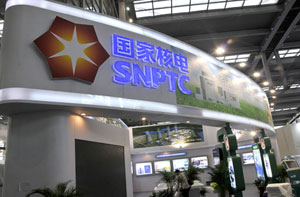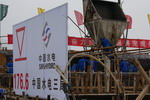Slower GDP growth in Q4 predicted
Updated: 2011-09-26 13:57
(Xinhua)
|
|||||||||||
BEIJING -- A preliminary reading of the HSBC purchasing managers' index (PMI) signaled a contraction of China's manufacturing sector for the third consecutive month in September, which has afforded a prospect for slower GDP growth in China in the last quarter of 2011.
Besides, on account of domestic tightening policies and a dull outlook for the global recovery, the International Monetary Fund (IMF) and the Asian Development Bank (ADB) both lowered their estimate for China's growth for this year and the next.
"At present and in the following period, China's economic growth momentum remains relatively strong, but in the short term, China faces challenges of rapid price increases and more capital inflows," said Zhou Xiaochuan, China's central bank governor in a statement posted on the website of the People's Bank of China.
Groundless fears of hard landing
The HSBC preliminary PMI for China's manufacturing sector fell to a two-month low of 49.4 in September from August's final reading of 49.9.
A reading above 50 indicates an expansion of the manufacturing sector, while a reading below 50 suggests shrink.
New export orders contracted at a faster pace in September than August, the preliminary PMI said, amid deepening sovereign debt woes in Europe and budget deficit problem in the United States, which are major importers of Chinese products.
More importantly, as one of the leading economic indicators, the downturn of PMI may predict that the pace of China's economic growth will slow further in the future.
However, HSBC said the contraction was at a fractional rate, suggesting the chances of a hard landing is remote.
"This is a similar moderating growth picture as in the previous two months. Fears of a hard landing are unwarranted," said Qu Hongbin, the chief economist at HSBC.
The decrease of PMI is related with the worsening global economic climate, noted Zheng Chaoyu, a professor from the School of Economics of Renmin University of China, adding that the index means the slowdown in the growth of domestic economy.
But he also stressed that it only indicated a deceleration and the double dip recession for the world's major economies is unlikely.
Weakening economic conditions
The global economic climate has become much more uncertain because of slow recovery in advanced economies and worries about debt problems in many countries, said Olivier Blanchard, the IMF's chief economist.
He expressed that the sovereign debt crisis in part of Europe needs "urgent action," otherwise the crisis in the relatively small economies such as Greece might risk mushrooming to the rest of Europe.
Robert Zoellick, President of the World Bank also warned the global economy is in a dangerous phase, with a narrowing path to recovery,
He urged that Europe, Japan and the US must act now to tackle their financial problems before they spread to less well-off countries.
"A crisis made in the developed world could become a crisis for developing countries," he added.
China would be stricken by deteriorating economic situation in the developing countries, said Robin Bew, chief economist of the research unit of the Economist Group.
He emphasized that the depressed economy in the developed countries would result in negative investment and import downturn from China, which would in turn also have severe impact on other economics-related fields in China.
Moreover, China is now increasingly integrated into the world economic community. If the debt crisis becomes a contagion and spreads to more and more areas in the world, the nation's exports will bear even greater pressures in the future," Bew added.
Data with the General Administration of Customs show that China-EU trade started to trend down in the second quarter of last year. In the first eight months this year, the nation's exports to the EU rose 18.5 percent, lower than the average growth rate of 23.9 percent for the past 10 years.
Related Stories
Chinese PMI rose in August 2011-09-02 14:25
PMI rebounds to 50.9% in August, shows signs of stabilizing 2011-09-01 10:31
China's GDP growth in 2010 revised up to 10.4% y-o-y 2011-09-07 17:36
GDP growth could dip under 9% 2011-09-07 08:54
- VW again raises stakes with record investment
- Sky's the limit for owners of private jets
- McDonald's licensed for expansion
- Beijing's 2nd-hand home sales drop to 3-yr low
- Calls for faster tax reform
- A white knight riding to the rescue?
- Europe warned over its debt crisis
- China issues 1st evaluation report on SCO













